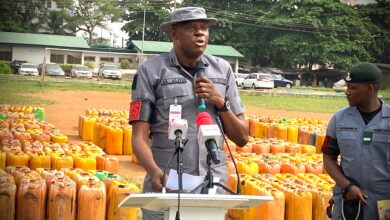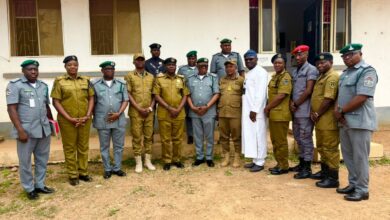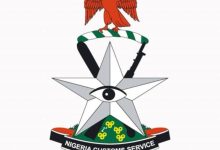How Tinubu Can Extract Blue Economy Potentials from Existing Laws, Functional NIMASA , Says Amiwero
... 'Cabotage Act Has Not Benefited Nigerians 21Years After'

Lucky Amiwero, a licensed customs agent and trade expert has called on President Bola Tinubu to explore the inherent benefits of the Coastal and Inland shipping (Cabotage) Act 5 of 2003;The Nigerian Maritime Administration and Safety Agency(NIMASA) Act No. 17 of 2007 and Nigeria Oil and Gas Industry Content Development Act No. 2 of 2010.
In a letter to President Tinubu,dated April 2 , 2024, Amiwero who identified lack of defined strategy for implementation of the laws,explained that twenty one years after the cabotage act was signed with the aim of protecting the interests of indigenous investors and professionals in the maritime industry, it has not made any meaningful impact.
According to him, NIMASA’s inadequacy, absence of a defined strategy ,and will for dutiful implementation has made it impossible for Nigerians to fully reap the gains which were intended by the laws for their benefit either as investors, professionals or artisanal employees in the maritime industry.
He drew Tinubu’s attention to Section 105 of the Nigerian Oil and Gas Industry Content Development Act of 2010 ,which according to him,empowers (NIMASA) to enforce the compliance with the Coastal and Inland Shipping (Cabotage) Act 5 of 2003 and matters pertaining to Nigeria Content development Act of 2010
He added that the creation of capacity on indigenous operation and employment in the Maritime Industry, is the responsibility of the Nigerian Maritime Administration and Safety Agency (NIMASA) as contained in the three(3) Legal instruments
He identified the need for NIMASA to build indigenous capacity in the country to set the stage for steady economic growth which directly speaks solutions to the chains of challenges facing the country.
He called on President Tinubu to halt perceived capital flight whereby foreigners who dominate the maritime sector are taking the funds out rather than developing the country with them.
Amiwero said virtually, all Maritime Nations provides direct or indirect aid to their Merchant fleet and maritime operation, which may include:
Operation Subsides, Construction Subsidies, Trade in allowance, official law Interest loans, Official loan Guarantees, Tax-free reserve Fund, Duty-Free import or Required Materials, Cargo Reserves Policy and (Cabotage) regime
Amiwero, who is the President of the National Council of Managing Directors of Licensed Customs Agents (NCMDLCA) told Tinubu that “since the enactment of these three legislative instruments meant for the development of indigenous capacity in the Maritime Sector, Nigeria is yet to find its feet due to the absence of developmental strategy as contained in various Acts, which is to activate and trigger the activities of indigenous operators and generate employment.
“Nigeria as A Maritime Nation needs to speedily develop, organizational architecture and responsibility to ensure the continuous growth of the Nigerian Economy in an increasing, dangerous and competitive environment, which resulted to the National Council of Managing Directors of Licensed Customs Agents (NCMLCA) to earlier press for the proper implementation, with respond from the Presidency
“Since the enactment of these three (3) legislative instruments meant for the development of indigenous capacity in the Maritime Sector, Nigeria is yet to find its feet due to the absence of developmental strategy as contained in various Acts, which is to activate and trigger the activities of indigenous operators and generate employment.
“Nigeria as A Maritime Nation needs to speedily develop, organizational architecture and responsibility to ensure the continuous growth of the Nigerian Economy in an increasing, dangerous and competitive environment, which resulted to the National Council of Managing Directors of Licensed Customs Agents (NCMLCA) to earlier press for the proper implementation, with respond from the Presidency
The provision of Section 105 of the Nigerian Oil and gas Industry Content Development Act of 2010 empowers (NIMASA) to enforce the compliance of the Coastal and Inland Shipping (Cabotage) Act 5 of 2003 and matter pertaining to Nigeria Content development Act of 2010
The creation of capacity on indigenous operation and employment in the Maritime Industry, is the responsibility of the Nigerian Maritime Administration and Safety Agency (NIMASA) as contained in the three(3) Legal instruments
Virtually, all Maritime Nations provides direct or indirect aid to their Merchant fleet and maritime operation, which may include:
Operation Subsides, Construction Subsidies, Trade in allowance, official law Interest loans, Official loan Guarantees, Tax-free reserve Fund, Duty-Free import or Required Materials, Cargo Reserves Policy and (Cabotage) regime
THE NIGERIAN MARITIME ADMINISTRATION AND SAFTEY AGENCY(NIMASA) AND THE DEVELOPMENT OF INDIGENOUS CAPACITY AND MARITIME INFRACSTUCTURE
The objective of the Agency shall be to
Section 1-(i) Promote the development of indigenous commercial shipping in international and Coastal shipping trade
THE 3%(PERCENT) GROSS FREIGHT OF (NIMASA) IS THE PAYMENT MADE BY NIGERIA IMPORTERS/ EXPORTERS
The 3%(percent) gross Freight on all international inbound and outbound cargo is the direct contribution of freight paid by importers./Exporters on Cargo shipped into the country and out, which is prescribed and contained under
The funding of (NIMASA) is contained in Section 15-(a-h) that from the following sources:
3% (percent) of gross freight on all international inbound and outbound cargo from ships or shipping companies operating in Nigeria ,to be collected and paid over to the agency to meet its operational costs
0.5% percent of stevedoring charges collected by employers of dock labor
All fees for ship registration, license, surveys, examination certificate and permits issued by the agency, fines and levies paid to the agency
All other financial assets that may from time to time be vested in or accrue to the Agency in the course of performing its function under this Act or pursuant to this Act;
All other sum collected or received by the Agency for services rendered or facilities provided by the Agency;
Gift, grants, aids, etc.; and
All such other sums as may be received by the Agency from other sources
Copy of Section 15 of NIMASA Act is attached and marked appendix 2
Purpose of Maritime Fund
The provision of Section 16-(2)(a) states, the Agency shall provide 25%(percent) of its revenue for the Maritime FUND authorized the allocation of 25%(percent) of the total revenue generated by the agency to be used for Maritime Fund
(b) Not less than 5% of its revenue for the Maritime Academy of Nigeria in its plans as per subsection (1) and (2)
5. MARITIME FUND FOR THE DEVELOPMENT OF INDIGENOUS SHIPPING AND SHIPPING INFRACSTUCTURE
The Maritime fund was established under Section 17-(1)
Section 17-(2) clearly states, Monies in the Fund may be applied only for the purpose of furthering the objectives and function of the Agency under this Act.
The core objective of the Agency is prescribed in Section 1-(i) of the Act, which clearly states, the objectives of the Agency (i) promote the development of indigenous commercial shipping in international and Coastal shipping trade
Section 17-(4) clearly states, The Agency may apply monies in the FUND to promote the development of indigenous shipping and shipping infrastructure in Nigeria
Section 17-(5) clearly states, the beneficiaries of the Fund under section (4) of this Section shall be Nigeria Citizens and companies
THE CRITICAL FUNCTION OF (NIMASA) IS TO BUILD INDIGEHOUS CAPACITY IN LINE WITH THE ACT UNDER FUNCTIONS AND POWERS
The vital aspect that are contained in the Act for the development of indigenous Capacity and generation of employment is as follows:
The agency function as prescribed in Section 22-(k) is essentially to develop and implement policies and programs, which will facilitate the growth of local capacity in ownership, manning and construction of ship and other Maritime Infrastructure
The agency is expected to administer policy for the development of shipping in general as contained in Section 22-(2)-(c )
Copy of Section 22-(k) of NIMASA Act is attached and marked appendix 4
THE CARGO RESERVED POLICY AND CARRIAGE RIGHT FOR NIGERIA INDIGENOUS OPERATORS
The Nigeria Cargo reserved Policy is contained in the following provision of the Act:
Section 35-(a-g) stipulates, the grant of National Carriers status of Nigeria shipping Company
Section 36, gave the exclusive right of National carrier for the carriage of export and import cargo belonging to the Federal Government including Federal and State owned companies and agencies
Section 37-(1&2) National Carrier to participate in the carriage of bulk, dry or liquid cargo and subject of 50%(percent) of such cargo
Section 37-(3-5) all other Cargo to and from Nigeria outside the jurisdiction of liner conferences, shall be subject to a carriage right of not less than fifty50% (percent), cargo support to cover the totality of available trade, including bulk, dry and liquid cargo and 50%(percent) generated cargo through assistant or international aid
Section 37-(6) clearly states, the Agency(NIMASA) shall determine an efficient strategy, for the participation of National carriers in the carriage of CRUDE AND PETROLUM products to and from Nigeria
8. DEVELOPMENT OF INDIGENOUS OWNERSHIP AND SHIPPING INFRASUCTURE
The provision of Section 39-(2) clearly states, the agency shall develop and implement policies and measures to promote indigenous ownership of ship and shipping infrastructure.
Copies of Section 35,36, 37, and 39 of NIMASA Act is attached and marked appendix 5(a)(b)(c)&(d)
9. COASTAL AND INLAND SHIPPING (CABOTAG) ACT NO.5 OF 2003
9.1 DEVELOPMENT OF INDIGENOUS CAPACITY BY THE RESTICTION OF VESSEL IN DOMESTIC TRADE
To empower the indigenous operators, the Coastal and Inland Shipping (Cabotage) Act, under Part 11, places restriction on the following:
Section 3. A vessel other than a vessel wholly owned and manned by a Nigerian Citizen, built and registered in Nigeria shall not engage in the domestic coastal carriage, or cargo and passengers within the Coastal, territorial, Inland Waters, Island or any point within the waters of the Exclusive Economic Zone of Nigeria
RESTRICTION OT TOWAGE
Section 4-(1) A tug or vessel not wholly owned by a person who is a Nigerian Citizen shall not tow any Vessel from or to any Port or point in Nigerian Waters, or tow any Vessel carrying any substance whatsoever whether of value of no or any dredge material whether or not it has commercial value from point within Nigeria
RESTRICTION OF THE CARRIAGE OF PETROLUM PRODUCTS
Section 5. A Vessel, tug, or barge of what ever type other than a Vessel, tug and barge whose beneficial ownership resides wholly in Nigeria Citizen shall not engage in the carriage or materials or supply service to and from oil rigs, platform and installation or the carriage of petroleum products between oil rigs, platforms and installations whether off shore or onshore or within and Port or point in Nigerian waters.
RESTICTION OF NAVIGATION IN INLAND WATERS
Section 6.A Vessel of whatever type or size shall not engage in domestic trading in the inland waters of Nigeria except a Vessel that is wholly owned by Nigeria Citizens
RESTICTION FOR REBUILT VESSEL
SECTION 7-(1)In case of rebuilding a vessel, such Vessel, shall be eligible for cabotage service if the entire rebuilding including the construction of any major component of the hull or superstructure of the vessels is effected in Nigeria
HINDRANCE TO THE IMPLEMENTATION OF (CABOTAGE) INDIGENOUS OPERATION
WAIVER ON WHOLLY NIGERIAN OWNERSHIP
The Provision of Section 9 gave the Minister power to grant waiver, when he is satisfied that, there is no wholly Nigerian owned vessel available as prescribed in the application, which is inimical to the growth of the Maritime industry.
WAIVER ON MANNING
The provision of Section 10 allows the Minister to grant waiver to Vessels to be wholly manned By Nigerian Citizens, where he is satisfied that there is no qualified Nigerian officer or crew for the position specified in the application
WAIVER ON NIGERIAN BUILT VESSELS
The provision of Section 11-(1) allows the Minister to grant a waiver for the vessel to be built, where he is satisfied that no Nigerian shipbuilding company has the capacity to construct the vessel specified in the application
THE REVIEW OF WAIVER SYSTEM AFTER FIVE YEARS BY THE NATIONAL ASSEMBLY
Section 14-(2) states, that the waiver system provided under this Act maybe reviewed after Five(5) years from the commencement of this Act by the National Assembly
The waiver system should have been reviewed since 2008 to enhance the capacity of the indigenous operators for effective implementation of the Cabotage regime.
Copy of section 3,4,5,6,7 8,9 10 12, 12,13 and 14 of the Coastal and inland Shipping (Cabotage) Act is attached and marked appendix 6(a-l)
THE WAIVER CLAUSE AS A SET BACK TO THE DEVELOPMENT OF INDIGENOUS OPERATION AND THE CREATION OF EMPLOYMENT
The waiver clause in Section 9,10,11,12 and 13 of the Act allows the Minister to issue waiver on every component of the (Cabotage) regime, which reduces the participation of the indigenous operators in the (Cabotage) activities and allow the continuous domination of foreign operators in both our waterborne commerce and (cabotage) regime
The continuous existence of the waiver clause in the Act, will rob the nation of the following:
1.The continued Dominance of freight component by foreign operators
Capital flight of huge transfers of foreign exchange out of the country due to foreign dominant power
3.Lack of employment of Nigerian operators due to non participation of indigenous operators
4. Lack of ownership of Maritime Infrastructure by indigenous operators as a result of non- operation
5,Lack of skill as a result of the continuous use of the foreign operators due to waiver
12.THE DEVELOPMENT OF CABOTAGE VESSEL FINANCING FUND
(I)The purpose of the FUND as contained in Section 42-(2) of the Act shall be: to promote the development of indigenous ship acquisition capacity
(2)By providing financial assistance to Nigeria Operators in the domestic Coastal shipping
THE FUNDING OF CABOTAGE
The Funding is from the following:
A Sur-charge of 2%(percent) of the contract sum performed by any vessel engaged in the coastal trade;
A sum as shall from time to be determined and approved by the National assembly
Monies generated under this Act including the tariffs fines for licenses and waivers
Copy of Section 42,43,44, and 45 of the Coastal and Inland Shipping (Cabotage) Act is attached and marked appendix 7
13. BENEFICIARIES OF THE FUND( CABOTAGE) VESSEL FINANCING FUND (CVFF)
The beneficiaries of the FUND shall be Nigerian Citizen and shipping companies wholly owned by Nigerians
14. NIGERIAN OIL AND GAS INDUSTRY CONTENT DEVELOPMENT ACT NO.2 OF 2010
The Act clearly states in Section 3-(1)
Independent operators shall be given first consideration in the award of oil block, oil field license, and oil lifting license and in all projects for which contract is to be awarded in Nigeria Oil and gas Industry
Copy of Section 3 of Nigerian oil and Gas Industry Content Development Act No,2 of 2010 is attached and marked appendix 8
15. EXCLUSIVE CONSIDERATION OF NIGERIA INDIGENOUS SERVICE COMPANIES
Section 3-(2) clearly states, there be exclusive consideration of Nigerian indigenous service companies, which demonstrates ownership of equipment, Nigerian personnel capacity to execute such work
Section 10-(1) clearly states, a First consideration shall be given to services provided from within Nigeria and to goods manufactured in Nigeria.
Section 28-(1) of the Act states, Nigerian shall be given the first consideration of employment and training in any project executed by any operator or project promoter
REQUIREMENT FOR LABOR CLAUSE
Section 35 clearly states, all operators and companies operating in Nigeria Oil and Gas Industry shall employ only Nigerians in their junior and intermediate cadre or any other corresponding grades designated by the operator of the company
Copy of Section 10, 35 of the Act is attached and marked appendix 9&10
16. THE FUND OF THE LOCAL CONTENT ACT
Section 104-(1) was established for the purpose of funding the implementation of the content Development in Nigeria Oil and Gas industry
Section 104-(2) states, the Sum of 1%(percent) of every contract awarded to any operator, contractor, subcontractor, alliance partners or any other entity involved in any project, operation, activity or transaction in the upstream sector of the Nigerian Oil and Gas Industry shall be deducted at source and paid into the fund.
17. THE NIGERIA CONTENT MONITORING BOARD IN CONJUCTION WITH NIMASA SHALL HAVE POWER TO ENFORCE THE CABOTAGE ACT
Section 105 of the Act clearly states, the Nigerian Content Monitoring Board in conjunction with NIMASA shall have power to enforce compliance with relevant Section of Coastal and Inland Shipping (Cabotage) Act in relation to matters pertaining to Nigerian Content Development
Copy of Nigerian Oil and Gas Industry Content Development Act No.2 of 2010 is attached and marked appendix 11
CONCLUSION AND RECOMMEDATION
National carriers status should be developed and facilitated by (NIMASA) for the expansion of fleets , in the carriage of shared cargo based on the Act,
On National Carriers, it is the agency that will develop and implement policies and programs, which will facilitate the growth of the Local Capacity:
in ownership, manning and construction of ship and other Maritime infrastructure as contained in Section 22-(k) of NIMASA Act 17 of 2007
Carriage of bulk or liquid cargo must be initiated by NIMASA to empower the indigenous operators as contain in the Act
(c ). Fifty 50%(percent) of Cargo to and from Nigeria, the sharing ratio must be implemented to galvanize and kick start the participant of indigenous operators
(d)Nigerian flagged vessel to carry fifty 50%(percent) cargo generated through technical assistance (NIMASA) should work out modalities for the proper implementation in conjunction with other Federal government agencies as contained in the Act.
(e) The carriage of crude and petroleum product to and from Nigeria should be implemented to build capacity and generate employment in line with the Act
(f)Administer policy or the development of shipping in general
(g)Develop and implement policies and programs, which will facilitate the growth of local capacity in ownership, manning and construction of Ship and Maritime infrastructures
(h) Review and remove the waiver clause of the cabotage operation of Section 9,10,11, 12 and 13 to build capacity and generate employment
(i) Constitute Cabotage taskforce consisting of all stakeholders, to see to proper implementation of the three(3) Acts
(j)Implement the provision on Towage, carriage of petroleum product, navigation in inland waters, shipyards and ships manning so as to build capacity and generate employment
(k) Implement the local content on labor requirement, contract and manufacture of the local content
(l)NIMASA in conjunction with the Nigerian Content Monitoring board shall have powers in line with the section 105 of the Act, to enforce compliance and relevant section of Coastal and Inland shipping (Cabotage )Act ,in relating to matters pertaining to Nigeria content development
The springboard of any successful Maritime operation globally depends on the proper implementation of the following:
Cargo reservation policy
Incentive/subsidies
Domestic trade restriction policy(Cabotage)
Shipyard and shipbuilding
Fleet expansion program
Development of Maritime infrastructure and
Capacity building initiatives are all contained in the three (3) Acts.











